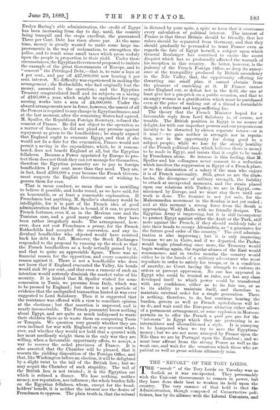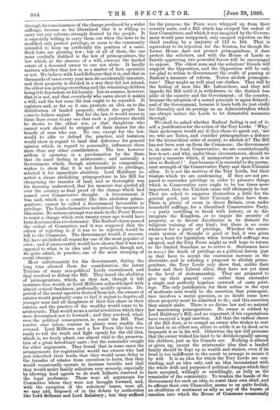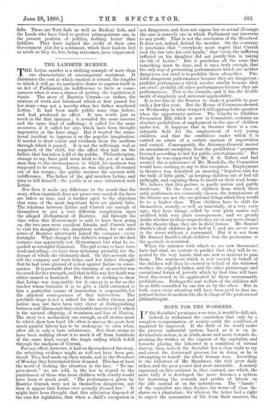THE " REVOLT " OF THE TORY LORDS.
Trevolt " of the Tory Lords on Tuesday was as _L foolish as it was unexpected. They presumably wish the Unionist Government to remain in power, but they have done their best to weaken its hold upon the country. The very essence of that hold is that -the Administration, though composed of Consexwative poli- ticians, has by its-alliance-with the Liberal Unionists, and be shown to the eldest son, or that daughters who We shall be asked whether Radical feeling is not of it- cannot work should be stripped of their shares for the self a justification for the action of the Tory Lords. Why,' benefit of sons who can. No one, except for the law, their spokesmen would say if they chose to speak out, are would be able to defend the practice, and testators we, who are Tories, and consider primogeniture a defence would show in regard to land that deference for general for the hierarchical order of society, to abolish it? The Bill opinion which, in regard to personalty, influences them has not been sent up from the Commons ; the Government more than any other consideration. The law, however is, in name at least, Conservative; we are constitutionally seldom it operates, is a proclamation by the State free to act; and why, under those circumstances, should we that its inner feeling is aristocratic ; and naturally a accept a measure which, if unimportant in practice, is in Government which, though aristocratic in composition, idea so Radical ' Just because it is essential to the perma- wishes to show that it is not favourable to privilege, nent strength of the Conservative Party and their Unionist selected it for immediate abolition. Lord Halsbury in- allies. It is not the motives of the Tory Lords, but their serted a clause abolishing primogeniture in his Bill for wisdom which we are condemning. If they are not pre- cheapening the transfer of land, and so thoroughly was pared to surrender privilege in order to preserve things his meaning understood, that his measure was quoted all which in Conservative eyes ought to be ten times more over the country as final proof of the change which had important, then the Unionist cause will ultimately be lost. passed over Conservative thought. A Government, it They are asked to suppress themselves a little for the was said, which in a country like this abolishes primo- general good, just as their Unionist allies have done. geniture, cannot be called a Government favourable to There is plenty of room in Great Britain, even under privilege. The Lords themselves understood the measure in household suffrage, for a liberalised Conservative Party, this sense. No serious attempt was made in the Peers' House —a party unwilling to break with history, or to dis- to resist a change which even twenty years ago would have integrate the Kingdom, or to impair the security of been denounced as revolutionary. The Radical clause passed property, or to favour Jacobinism in its distaste for the ordeal of Committee, and it was supposed that the religious training of any kind ; but there is no room odium of rejecting it, if it was to be rejected, would be whatever for a party of privilege. Whether the aristo- left to the Commons. The Government would, if success- erotic system of thought is good or bad, it was given ful, have abolished all reason for one of the most popular of up as a basis for legislation when household suffrage was cries ; and if unsuccessful, would have shown that it was not adopted, and the Tory Peers might as well hope to return opposed to what is in idea and in principle, though not, to the limited franchise as to revive it. Statesmen have we quite admit, in practice, one of the most sweeping of to accept the death of privilege as a political datum just social changes. as they have to accept the enormous increase in the Most unfortunately for the Government, during the electorate, and in refusing a proposal to abolish primo- long time allowed them for consideration, the latent geniture, the Tory Lords only show that, unlike their Toryism of many non-political Lords reawakened, and leader and their Liberal allies, they have not yet risen they resolved to defeat the Bill. They hated the abolition to the level of statesmanship. They are prepared to of primogeniture, which, as they saw, though it left give up their general cause rather than surrender testators free, would, as Lord Milltown acknowledged with a single and perfectly hopeless outwork of caste privi- almost cynical frankness, profoundly modify opinion. De- lege. The only justification for their action in the eyes prived of the moral sanction derived from law, the owners of of moderate men would be the assertion that primogeni- estates would gradually come to feel it unjust to deprive all ture involves a moral question, as no doubt some laws younger sons and all daughters of their fair share in their about property must be admitted to do; and this assertion estates, and the practice of the wealthy would cease to be they cannot make. There is no divine law and no natural aristocratic. That would mean a social revolution which they law sanctioning primogeniture. No owner is robbed by were determined not to forward ; and they resolved, what- Lord Halsbury's Bill, and no expectant, if his expectations ever the political consequences, to resist the Bill. That have received a legal sanction. All that the radical clause resolve once taken, reasons in plenty were readily dis- of the Bill does, is to compel an owner who wishes to vest covered. Lord. Milltown and a few Peers like him were his land in an eldest son, either to settle it so by deed, or to ready to tell the truth and fight openly for the old idea, bequeath it so in his will. Otherwise the law will presume which is, we freely admit, one almost vital to the preserva- that the owner wished his land to be divided equally among tion of a great hereditary caste ; but the remainder sought his children, just as his Consols are. Nothing is altered for other arguments. They found that in some cases the or given up, except the aristocratic idea that a landed arrangements for registration would tax owners who had family should be kept up in wealth and station, even if its just inherited their lands, that they would cause delay in head is too indifferent to the result to arrange to secure it the transfer of estates from executors to heirs, that they by will. It is an idea for which the Tory Lords are con- would occasionally operate to increase trouble, and that tending, and an idea only, and an idea inconsistent with they would mulct family solicitors very severely, especially the whole drift and purpose of political changes which they by allowing land agents to do work hitherto reserved to have accepted, willingly or unwillingly, as fully as the the legal profession. Those were all arguments for remainder of the community. To weaken the hands of the Committee where they were not brought forward, and, Government for such an idea, to resist their own chief, and with the exception of the solicitors' losses, were all, to affront their own Chancellor, seems to us quite foolish, we may add, disposed of in the debate by authorities an ebullition of sentiment as silly as any of the bursts of like Lord Selborne and Lord Salisbury ; but they sufficed emotion into which the House of Commons occasionally through its consciousness of the change produced by a wider for the purpose, the Peers were whipped up from their suffrage, become so far liberalised that it is willing to country seats, and a Bill which has escaped the ordeal of carry out any reforms strongly desired by the people. It four Committees, and which it was imagined by the Govern- is especially willing to carry them out when the laws to be went would pass unopposed, only escaped rejection on the modified only protect privilege, or seem to the community third reading by a majority of 113 to 104. That is intended to keep up artificially the position of a caste. equivalent to its rejection for the Session, for though the Such laws are growing few ; but of all of them, the one Lower House dare not protect primogeniture, it dare most cordially disliked is the law of primogeniture, the protect the solicitors, and with the House of Lords so law which, in the absence of a will, conveys the landed faintly approving, two powerful forces will be encouraged estate of a deceased owner to. one son alone. It hardly to oppose. The eldest sons and the solicitors' friends will matters whether that law is, as a matter of fact, operative support the Opposition, and the Opposition will be only or not. We believe with Lord Selborne that it is, and that in too glad to refuse to Government the credit of passing so thousands of cases every year men die accidentally intestate, Radical a measure of reform. Tories abolish primogeni- and their property is divided in a way they did not intend, ture ! They might as well steal our clothes. That will be the eldest son getting everything and the remaining children the feeling of men like Mr. Labouchere, and they will being left dependent on his bounty. Let us assume, however, impede the Bill until it is withdrawn, to the distinct loss that it is not, and that everybody who cares about it makes alike of the country and the Government : of the country, a will, and the law none the less ought to be repealed. It because the adoption of a sound principle is again delayed ; registers and, so far as it can, protects an idea as to the and of the Government, because it loses both its just credit distribution of landed property, which the people has for liberality and its prestige as an Administration which come to believe unjust. But for the law, it would never in can always induce the Lords to let distasteful measures these days occur to any one that such a preference should through. falls. There are Tory fads as well as Radical fads, and the Lords who have tried to protect primogeniture are, in the present position of politics, nothing better than faddists. They have injured the credit of their own Government just for a sentiment, which their leaders feel as much as they do, but, being statesmen, have suppressed.




































 Previous page
Previous page